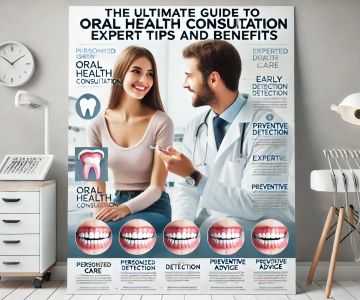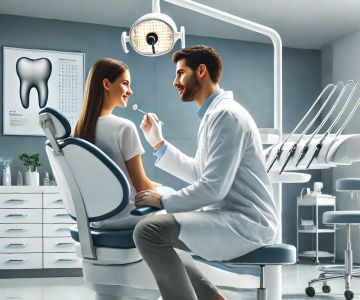How to Self Check for Oral Cancer: A Simple Guide for Early Detection
1. The Importance of Oral Cancer Self-Examination
Oral cancer, though often overlooked, can be life-threatening if not detected early. Detecting oral cancer at an early stage significantly increases the chances of successful treatment and recovery. Regular self-examination of your mouth is a simple yet crucial way to identify any unusual changes. Knowing what to look for can save your life, as early intervention is key to managing this disease effectively.
Many people assume that oral cancer only affects heavy smokers or alcohol drinkers, but in reality, anyone can be at risk. Risk factors also include a history of oral cancer in the family, a weakened immune system, and even exposure to HPV (Human Papillomavirus). With this in mind, everyone should perform routine self-checks to ensure that no unusual signs are present in the mouth.
2. What to Look for During Your Oral Cancer Self-Examination
When performing an oral cancer self-exam, there are several key areas to focus on. Here’s how to properly check for potential signs of oral cancer:
- Examine the Lips: Look for any unusual lumps, swelling, or sores on the inside and outside of your lips. Pay close attention to any persistent sores that don't heal after a couple of weeks.
- Check the Gums: Gently lift your gums to look for any bumps, tenderness, or discoloration. If you notice any unusual growth or bleeding, it could be a sign of oral cancer.
- Inspect the Roof and Floor of the Mouth: Use your thumb and finger to feel for any lumps or thickened tissue along the roof and floor of your mouth. Look for any white or red patches, which can be indicators of oral cancer.
- Examine the Tongue: Check both the top and bottom of your tongue for any abnormal growths, ulcers, or painful areas. If you notice any persistent sores or bumps that don’t go away, it could be a cause for concern.
- Feel the Neck and Jaw: Gently palpate the areas around your jaw and neck to check for any lumps or swelling. Lumps that don’t move or are painful could indicate the spread of oral cancer to nearby lymph nodes.
3. Signs and Symptoms of Oral Cancer
While self-examinations are essential, it’s also important to recognize the potential signs and symptoms of oral cancer that may not be immediately visible. Common symptoms include:
- Persistent sore throat or feeling of something stuck in the throat
- Unexplained pain or difficulty swallowing
- Changes in voice or difficulty speaking
- Unexplained bleeding in the mouth
- Pain or tenderness in the mouth, jaw, or neck
- Unexplained weight loss or changes in appetite
It’s important to note that these symptoms do not always indicate cancer, as they can also be associated with less severe conditions like infections. However, if these symptoms persist for more than two weeks, you should seek medical advice to rule out any serious concerns.
4. How to Perform the Self-Check Effectively
To perform an effective self-examination, ensure you have proper lighting and a mirror, preferably one that magnifies the view. Stand or sit in a well-lit area and follow these steps carefully:
- Prepare the Area: Use a clean, well-lit mirror. You may want to use a flashlight or another light source to ensure you can see clearly.
- Take Your Time: Examine each area slowly and thoroughly. Don’t rush through the process. Spend a few minutes on each section of your mouth.
- Use Your Fingers: While looking in the mirror, use your fingers to gently feel around the gums, the roof and floor of your mouth, the inside of your lips, and under your tongue. Look for any lumps or thickened areas.
- Stay Calm: If you find something suspicious, don’t panic. Most oral conditions are benign, but it’s always better to get checked by a professional if you're uncertain.
5. When to See a Doctor
If you discover something unusual during your self-check, don’t wait too long to consult a healthcare professional. Some signs that warrant immediate medical attention include:
- Unexplained lumps or swelling in the mouth, neck, or jaw
- Lesions or sores that do not heal after two weeks
- Chronic pain or difficulty swallowing
- Any unusual changes in the appearance or feel of your mouth or throat
Oral cancer can spread quickly, so the sooner it's caught, the better the chances for effective treatment. A dentist or doctor can perform a more thorough examination and may refer you to an oncologist for further testing if necessary.
6. Prevention and Healthy Habits for Oral Cancer
While performing self-checks is vital, prevention is just as important. There are several habits that can help reduce the risk of developing oral cancer:
- Quit smoking and limit alcohol consumption
- Maintain a healthy diet rich in fruits and vegetables
- Practice good oral hygiene, including regular brushing and flossing
- Protect your lips from excessive sun exposure by using lip balm with SPF
- Get vaccinated against HPV, as certain strains of the virus are linked to oral cancer
By incorporating these preventive measures and performing regular self-exams, you can take proactive steps to ensure your oral health and reduce the risk of oral cancer.
For more information and personalized care, visit Dentistry Toothtruth, where you can find expert advice and recommendations for maintaining oral health.





 Westgate Dental Arts
Westgate Dental Arts Coventry Family Dental
Coventry Family Dental Familia Dental
Familia Dental Dr. Daniel S. Fife, DDS
Dr. Daniel S. Fife, DDS Dentistry At Suburban Square: Michael I. Wollock, DMD
Dentistry At Suburban Square: Michael I. Wollock, DMD Comfort Care Dental
Comfort Care Dental The Importance of Oral Health Education During Pregnancy for a Healthy Pregnancy
The Importance of Oral Health Education During Pregnancy for a Healthy Pregnancy Why Skipping Dental Checkups Can Lead to Bigger Oral Health Problems
Why Skipping Dental Checkups Can Lead to Bigger Oral Health Problems Advantages of Porcelain Dental Restorations
Advantages of Porcelain Dental Restorations Best Tips for Brushing Your Teeth Properly for Healthy Gums: Essential Techniques for Oral Health
Best Tips for Brushing Your Teeth Properly for Healthy Gums: Essential Techniques for Oral Health How Can Diabetes Cause Tooth and Gum Problems? Preventing and Managing Oral Health Issues
How Can Diabetes Cause Tooth and Gum Problems? Preventing and Managing Oral Health Issues Healthy Habits for Promoting Good Oral Health and Hygiene: Tips for a Healthy Smile
Healthy Habits for Promoting Good Oral Health and Hygiene: Tips for a Healthy Smile